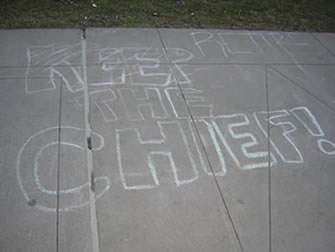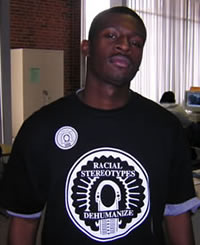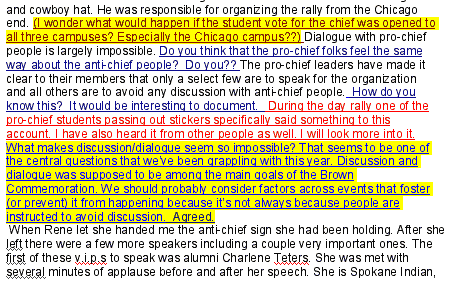

(a renowned orator, activist, community organizer, dancer, poet, and daughter of seven generations of devoted Lakota leaders)
“A Native student . . . said that she is tired of everyone thinking her identity is only in relation to the ‘Chief.’ She said that when someone meets her, the first thing they ask is not where she is from or about her schooling but instead her opinion on the ‘Chief’. . . . Anytime in one of her classes (from grade school on to the college level) Native Americans are discussed . . . she can see people turn and look at her to ‘see what the Indian says.’ “ Rene, who recognized this dynamic when reading Paul’s notes, added that it is a “similar situation to everyone looking at the African American in the class when talking about slavery or affirmative action.” Paul elaborated: “She said she does not even feel comfortable in the Native American class (it has close to 100 students, most of whom are white) since she is the only Native in the discussion section she was taking and they seem to do the same thing. . . . She said she came to the U of I to do nothing but get an education, but instead she was forced to get involved in being an activist because she could not deal with seeing the ‘Chief’ logo everywhere without trying to do something about it. She said that she does not feel safe at the U OF I and . . . that she is unable to ever just be a student because of the ‘Chief.’ She said that even though she is proud of her Native heritage she would like to have people look and relate to her as a person and not as the ‘Indian.’” (Chapter 1)
In light of all Cantor had said about her aims for the Brown Commemoration, Nicole asked her to name the year’s high and low points....The low point came to her easily, too. It was the “Chief Illiniwek” controversy, which exerted “such a stranglehold on things.” As Cantor put it, “One couldn’t in any very authentic way say that the Brown year included a really thorough examination of our history of discrimination or lack of inclusion with respect to Native Americans.” upon the change. (Chapter 2)


